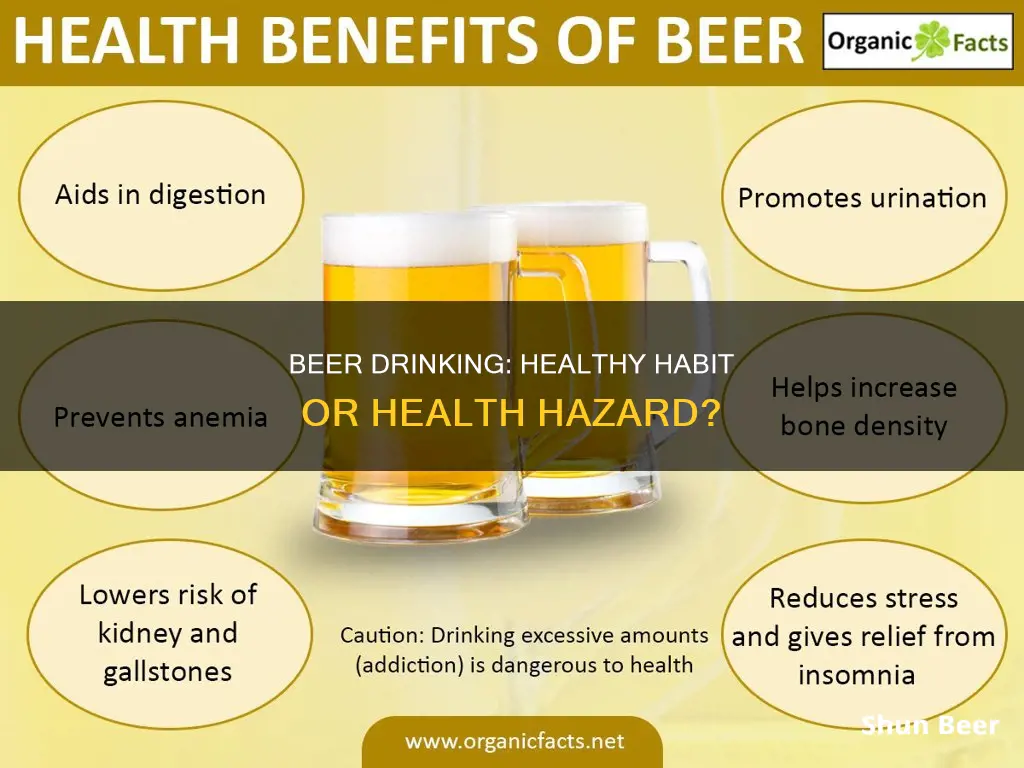
Beer is one of the world's oldest beverages, and its consumption has been linked to several health benefits. Beer is made by fermenting grain into alcohol, and it contains vitamins, minerals, antioxidants, and amino acids. However, excessive consumption can lead to health issues such as addiction, liver disease, weight gain, and cancer. So, can you drink beer and be healthy? The answer is yes, but only when consumed in moderation. Moderate drinking, defined as one drink per day for women and up to two drinks per day for men, has been linked to positive effects on heart health, blood sugar control, bone density, and dementia risk. However, heavy drinking eliminates these health benefits and contributes to negative health outcomes. Therefore, drinking beer in moderation as part of a balanced, healthy diet is key to reaping its potential health benefits while minimising the risks associated with excessive consumption.
What You'll Learn

Beer can reduce the risk of heart disease
Beer has been consumed by people for thousands of years and is one of the oldest beverages in the world. While beer is often viewed as empty calories, it does contain some vitamins and minerals. Beer is also an excellent source of antioxidants, with darker beers tending to have more antioxidants than lighter ones.
Several studies have shown that drinking beer in moderation may help lower your risk of heart disease. Research suggests that consuming one to two beers a day may help improve heart health. One study showed that one drink a day lowered the risk of all-cause mortality for women, and up to two beers a day produced the same results for men. Another study found that moderate alcohol intake, defined as 14 drinks per week for men and nine drinks per week for women, was associated with a 43% and 58% lower risk of diabetes for men and women, respectively.
The positive effects of beer consumption on heart health may be due to its ability to improve antioxidant properties and the body's ability to remove cholesterol. Beer may also help raise levels of "good" HDL cholesterol, which helps to remove fatty deposits from within blood vessels. Additionally, the alcohol in beer may contribute to its heart-healthy effects by altering blood chemistry and preventing clot formation in arteries that supply blood to the heart muscle.
It is important to note that excessive beer consumption can lead to negative health consequences, including an increased risk of heart disease, weight gain, liver disease, and cancer. Therefore, it is crucial to drink in moderation and prioritize a healthy lifestyle that includes regular exercise and a diet rich in fruits, vegetables, whole grains, and lean proteins.
Beer and Paracetamol: Safe Mix or Not?
You may want to see also

Beer can improve blood sugar control
Beer has been consumed for thousands of years, and while it is often viewed as nutritionally empty, it does contain vitamins and minerals. Beer is also associated with several health benefits, including improved blood sugar control.
Light to moderate alcohol intake may improve blood sugar control, an issue for many people with diabetes. Several studies have found that light to moderate alcohol intake appears to reduce insulin resistance, a risk factor for diabetes, as well as the overall risk for developing type 2 diabetes. A large study of over 70,500 participants found that moderate alcohol intake was associated with a 43% lower risk of diabetes for men and a 58% lower risk for women.
The positive effects of beer on blood sugar control are strongest for low-sugar beers, such as light beers. A 2018 study concluded that low to moderate alcohol consumption is associated with better blood sugar levels and a reduced risk of developing type 2 diabetes. Another study from 2019 found that moderate alcohol consumption may decrease the risk of developing dementia, a condition that is often linked to high blood sugar levels.
It is important to note that heavy and binge drinking can counter these benefits and significantly increase the risk of diabetes. Alcohol can affect diabetes medications and interfere with their effectiveness. Additionally, drinking beer or alcohol after exercising can negatively impact blood glucose regulation.
While beer can have positive effects on blood sugar control, it is important to consume it in moderation. The recommended amount is one drink per day for women and no more than two drinks per day for men.
Tanning with Beer: Does It Work?
You may want to see also

Beer can increase bone density
Beer has been consumed for thousands of years and is one of the oldest beverages in the world. While it is often viewed as a drink with little nutritional value, it does contain vitamins and minerals, and emerging research suggests that moderate consumption may have health benefits.
Beer and Bone Density
Drinking one or two standard beers per day may have positive effects on bone density. Research suggests that moderate alcohol consumption may help increase bone density in men and postmenopausal women. This benefit sharply drops when consumption passes two drinks per day, so moderation is key.
A 2019 study found that postmenopausal women from South Korea who drank 2–3 times per week had higher bone density than those who did not drink. Another study found that men who consumed 1–2 beers per day had higher bone density than those who did not drink at all.
The silicon content in beer may also play a role in bone health. Silicon is a major constituent of beer and has been found to promote bone formation. Beer is a major source of dietary silicon, especially for men.
Other Health Benefits of Beer
In addition to potentially increasing bone density, moderate beer consumption has been linked to other health benefits, including:
- Lower risk of heart disease: Research suggests that consuming one to two beers a day may help lower the risk of heart disease.
- Improved blood sugar levels: Light to moderate alcohol intake may help reduce the risk of developing diabetes and improve blood sugar control in people with diabetes.
- Lower dementia risk: Light to moderate alcohol intake has been associated with a reduced risk of dementia.
The Ultimate Beer Snorkel Experience: How Does It Work?
You may want to see also

Beer can lower dementia risk
Beer has been consumed for thousands of years and is one of the world's most popular alcoholic beverages. While beer is often viewed as empty calories, it does contain vitamins and minerals, including potassium, calcium, thiamine, iron, and zinc. Beer also contains B vitamins because it is made from cereal grains and yeast.
Drinking one or two standard beers per day may have positive effects on the brain and lower dementia risk. A 2019 study found that moderate alcohol consumption may help decrease the risk of developing neurodegenerative diseases such as Alzheimer's disease. Another study found that moderate alcohol intake may lower the risk of dementia. However, heavy alcohol intake can increase the risk.
It is important to note that excessive consumption of beer can lead to health issues such as depression, weight gain, and liver disease. Therefore, moderate consumption is key to reaping the potential brain health benefits of beer.
Birth Control and Beer: Safe to Mix?
You may want to see also

Beer can be part of a healthy diet
Beer has been consumed for thousands of years and is one of the world's oldest beverages. It is made by fermenting grain into alcohol and is usually made with malted barley, yeast, hops and other flavouring agents.
Although beer is often viewed as a drink with little nutritional value, it does contain vitamins and minerals, and some also contain antioxidants. Beer is a source of:
- B vitamins
- Folate
- Niacin
- Fibre
- Protein
- Potassium
- Calcium
- Thiamine
- Iron
- Zinc
Some of the potential health benefits of drinking beer in moderation (one to two beers a day) include:
- Lower risk of heart disease
- Improved blood sugar levels and lower risk of developing diabetes
- Increased bone strength
- Lower risk of osteoporosis
- Lower risk of neurodegenerative diseases such as Alzheimer's disease and dementia
However, heavy drinking (more than two drinks per day) can lead to many potential health risks, including:
- Addiction
- Reduced life expectancy
- Liver disease
- Weight gain
- Cancer
- Cardiovascular disease
- Neuropsychiatric diseases
Therefore, while beer can be part of a healthy diet, it is important to consume it in moderation and not to exceed the recommended amount.
The Magic of Beer Fob: How It Works
You may want to see also







